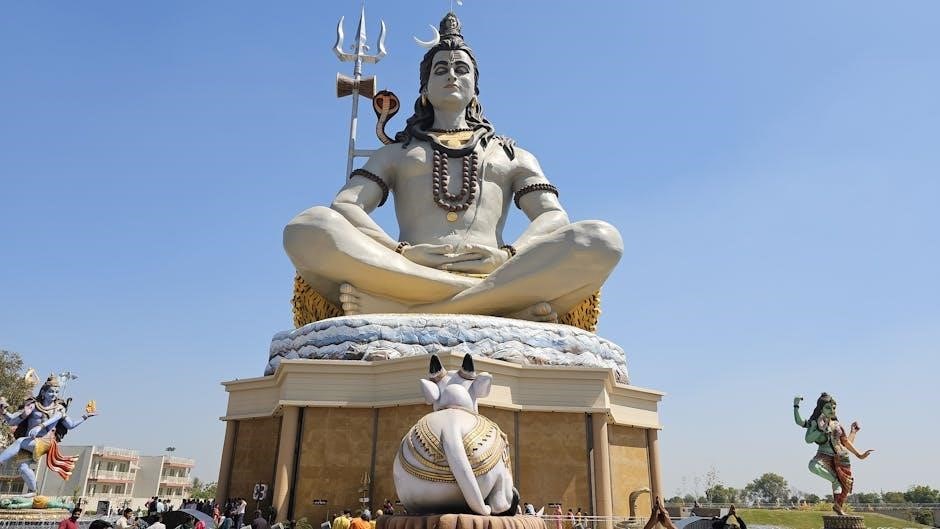Lord Shiva Ashtothram in Telugu PDF: An Overview
The Shiva Ashtothram, a sacred hymn with 108 names, glorifies Lord Shiva. Devotees often seek the Sri Shiva Ashtothram in Telugu PDF format, allowing them to easily access and chant the names, deeply connecting with Shiva’s divine essence.

Significance of Shiva Ashtothram
Chanting the Shiva Ashtothram holds profound spiritual significance, fostering devotion and seeking blessings. Each of the 108 names encapsulates an aspect of Lord Shiva’s divine attributes, and reciting them creates a powerful connection that enhances spiritual growth.
Benefits of Chanting
The recitation of Shiva Ashtothram bestows numerous spiritual and worldly benefits upon devotees. Regular chanting is believed to purify the mind, removing negative thoughts and fostering inner peace. This practice enhances concentration and mental clarity, aiding in meditation and self-realization. The vibrations produced during chanting create a positive aura around the devotee, protecting them from negative energies and promoting overall well-being.
Furthermore, chanting Shiva Ashtothram is said to alleviate stress, anxiety, and depression, fostering a sense of calm and tranquility. It is believed to bring harmony to relationships, resolving conflicts and promoting understanding. The divine names invoke Lord Shiva’s blessings, bestowing prosperity, success, and good fortune upon the chanter.
Devotees often experience a sense of divine connection and spiritual upliftment through this practice. Chanting can also help in overcoming obstacles, fulfilling desires, and attaining liberation from the cycle of birth and death. The Shiva Ashtothram is a powerful tool for spiritual growth and overall well-being.
Shiva Ashtothram: The 108 Names
Shiva Ashtothram comprises 108 divine names, each representing a unique aspect of Lord Shiva. Chanting these names is a powerful way to connect with the divine and seek his blessings for overall well-being;
First 10 Names
The Shiva Ashtothram commences with a powerful sequence of names, each resonating with profound meaning and divine energy. These initial names set the tone for the entire hymn, inviting devotees into a deeper connection with Lord Shiva. They are:
- Shiva: Auspiciousness
- Maheshwara: The Great Lord
- Shambhu: Source of Bliss
- Pinaki: Wielder of the Bow
- Shashi Shekhara: One Who Wears the Moon
- Vamadeva: The Delightful Lord
- Virupaksha: One with Unique Eyes
- Kapardi: One with Matted Hair
- Nilalohita: Blue and Red
- Shankara: Bestower of Good
Chanting these names with devotion can bring peace, prosperity, and spiritual growth. Each name encapsulates a specific quality of Shiva.
Next 10 Names
Continuing the sacred sequence of the Shiva Ashtothram, the next ten names further unveil the multifaceted nature of Lord Shiva. These names, rich in symbolism and divine essence, deepen the devotee’s understanding and reverence.
- Shulapani: Holder of the Trident
- Khatvangi: Possessor of the Skull-staff
- Vishnu Vallabha: Beloved of Vishnu
- Shipivishta: One in Whom All Beings Dwell
- Ambikanatha: Lord of Ambika (Parvati)
- Srikantha: Auspicious Necked One
- Bhakta Vatsala: Affectionate to Devotees
- Bhava: Existence
- Sharva: Destroyer
- Trilokesha: Lord of Three Worlds
These names highlight Shiva’s power, compassion, and his role as a protector and sustainer. Chanting them fosters a sense of connection with the divine and brings blessings into one’s life.

Telugu Lyrics of Shiva Ashtothram
Accessing the Shiva Ashtothram lyrics in Telugu allows devotees to chant with clarity. The Telugu rendition captures the hymn’s essence, enabling a deeper connection to Lord Shiva through precise articulation and heartfelt devotion.
Importance of Accurate Pronunciation
In reciting the Shiva Ashtothram in Telugu, accurate pronunciation holds immense significance. Each name of Lord Shiva carries profound spiritual weight, and precise articulation ensures that the intended meaning and energy are invoked correctly. The Telugu language, with its distinct sounds and intonations, requires careful attention to detail to maintain the integrity of the hymn.
Mispronunciation can alter the intended meaning, diluting the spiritual impact of the chant. Therefore, devotees are encouraged to learn the correct pronunciation from reliable sources, such as knowledgeable priests, experienced practitioners, or authentic audio recordings. By striving for accuracy, chanters can unlock the full potential of the Shiva Ashtothram, fostering a deeper connection with the divine.
Furthermore, accurate pronunciation enhances the aesthetic beauty of the recitation. The rhythmic flow and melodic cadence of the Telugu verses create a captivating auditory experience, elevating the spiritual atmosphere and inspiring devotion. Embracing the nuances of pronunciation is not merely a matter of linguistic correctness but a pathway to enriching the devotional experience and deepening one’s understanding of Lord Shiva’s glory.

Where to Find Shiva Ashtothram in Telugu PDF
Finding the Shiva Ashtothram in Telugu PDF is easy. Online resources, religious websites, and digital libraries offer downloadable versions. Ensure the source is reliable to guarantee accurate lyrics for devotional practice.
Online Resources
The digital age provides numerous avenues for accessing the Shiva Ashtothram in Telugu PDF. Several reputable online resources offer free downloads, allowing devotees to easily incorporate this sacred hymn into their daily prayers. Websites dedicated to Hindu scriptures and devotional content often host a variety of versions, catering to different preferences and regional variations.
Scribd, a popular online document-sharing platform, may contain user-uploaded versions of the Shiva Ashtothram in Telugu PDF. However, verifying the accuracy of these uploads is crucial to ensure correct pronunciation and understanding of the verses. Many other sites provide the ashtothram.
Furthermore, mobile applications focused on Hindu prayers and devotional songs frequently include the Shiva Ashtothram in Telugu, often with audio renditions to aid in pronunciation. These apps can be a convenient way to access and chant the names of Lord Shiva on the go. When searching for online resources, prioritize websites and apps known for their authenticity and adherence to traditional Hindu practices.

How to Chant Shiva Ashtothram
Chanting the Shiva Ashtothram involves clear pronunciation and a focused mind. Find a quiet space, and with reverence, recite each of the 108 names of Lord Shiva. Regular practice deepens devotion.
Best Time for Chanting
Selecting the appropriate time for chanting the Shiva Ashtothram significantly enhances its spiritual impact. Many devotees believe that the most auspicious times are during the Brahma Muhurta, the period before sunrise, or during Pradosham, which occurs in the evening twilight of the thirteenth day of each lunar fortnight.
These times are considered highly conducive to connecting with divine energies and experiencing a deeper sense of peace and devotion. The stillness and serenity of these hours provide an ideal backdrop for focused prayer and meditation.
Additionally, Mondays, dedicated to Lord Shiva, are regarded as particularly favorable for chanting his names. Festivals such as Maha Shivaratri are also prime opportunities to immerse oneself in the Ashtothram, amplifying its transformative effects.
Ultimately, the best time for chanting is when one can fully dedicate their attention and intention to the practice, free from distractions and worldly concerns. Whether it’s early morning, evening, or any other time, the key is to approach the chanting with sincerity, devotion, and an open heart, allowing the divine vibrations to resonate within.
Understanding the Meaning of the Names
Delving into the meanings behind each of Lord Shiva’s 108 names enriches the chanting experience. Understanding the significance fosters a deeper connection, transforming recitation into a profound spiritual journey.
Deepening Devotion
To truly deepen devotion through the Shiva Ashtothram, understanding the essence of each name is paramount. The “Sri Shiva Stotranidhi” offers insights, revealing the qualities and attributes associated with Shiva, like Maheshwara, Shambhave, and Pinaki. By grasping these meanings, the recitation becomes more than mere repetition; it transforms into heartfelt worship.
Consider “Neelalohita,” signifying Shiva’s blue and red complexion, symbolizing his mastery over poison and passion. Reflecting on this while chanting fosters reverence. Similarly, understanding “Vishnu Vallabha” highlights Shiva’s affection for Vishnu, promoting harmony. “Kapardi” denotes his matted hair, a sign of asceticism.
Engaging with commentaries and exploring Shiva’s stories related to each name enhances comprehension. This knowledge fuels a more profound emotional connection. Visualize the forms and qualities each name represents during recitation. Let the Shiva Ashtothram become a tool for understanding and embracing Shiva’s multifaceted nature. Study “Sri Shiva Ashtothra Sata Namavali” available online to learn the meanings.
Regular chanting, coupled with contemplation, cultivates unwavering devotion.
The Shiva Ashtothram in Telugu PDF provides a potent pathway to connect with Lord Shiva’s divine energies. By chanting these 108 names, devotees can invoke blessings, find solace, and deepen their spiritual understanding. Accessing resources like the “Sri Shiva Stotranidhi” enhances the chanting experience, leading to a more profound connection.
Remember, accurate pronunciation and understanding the meaning of each name amplify the benefits. Embrace resources such as online PDFs and audio guides to refine your recitation. Regular practice, ideally during auspicious times, solidifies the spiritual gains.
The Shiva Ashtothram transcends mere words; it’s a bridge to the divine. Each name encapsulates a facet of Shiva’s being, offering a glimpse into his limitless compassion. Through dedicated practice, devotees can experience inner peace, strength, and unwavering devotion. Let the Shiva Ashtothram be your guide on a transformative spiritual journey, fostering a deep connection with the Lord. The path awaits; begin your recitation today.

